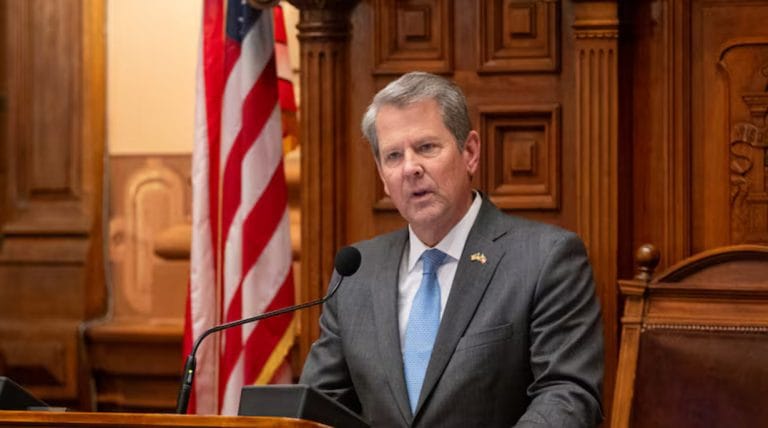🎧 Listen to This Article
In an era where inflation fatigue still lingers and federal stimulus checks are history, Georgia’s Governor Brian Kemp has gone all-in on tax cuts. Signing HB 111 and HB 112, Kemp has accelerated the state’s largest-ever income tax reduction and issued yet another round of surplus refunds. Combined, these moves represent more than $1 billion in immediate taxpayer relief.
But here’s the deeper story: This isn’t just fiscal generosity — it’s political positioning, economic messaging, and long-term risk all rolled into one.
What the Legislation Does — and Why It Matters
HB 111 expedites Georgia’s planned income tax rate cut, dropping it another 20 basis points to 5.19%, down from the original 5.75%. While this sounds modest, it will save Georgians an estimated $880 million in the next tax cycle — a substantial sum in any state budget.
HB 112 delivers a one-time refund — up to $500 per household — echoing previous relief rounds. This marks the third time Georgia has issued such rebates, funded by the state’s multi-year budget surplus.
For everyday Georgians, this is a financial cushion. For political leaders, it’s a trophy of fiscal conservatism. And for economists, it’s a case study in how states manage surpluses during economic uncertainty.
The Deeper Strategic Calculus
On the surface, Georgia’s approach mirrors the “supply-side” doctrine: cut taxes, return surpluses, boost disposable income, and spur growth. But few U.S. states have both the political will and fiscal room to implement this at Georgia’s scale. This tax relief is only possible due to several years of conservative budgeting and unexpectedly strong revenue performance — especially in 2021–2023, when federal COVID relief and consumer demand drove state revenues skyward.
Now, Georgia is monetizing that cushion — for voters.
Yet, this move may not age as gracefully as intended.
Relief Today, Repercussions Tomorrow?
- Structural Revenue Concerns
While the surplus-funded refunds are temporary, the income tax cut is permanent. If future revenue falls short — especially amid national recession threats or housing market contractions — Georgia may struggle to meet obligations without raising other taxes or cutting services. - Precedent and Pressure
Other states may now feel pressure to follow Georgia’s model. But without surpluses of their own, these moves could backfire elsewhere, leading to deficits or debt issuance. - Disparity in Relief
A flat refund and across-the-board rate cut may disproportionately benefit higher earners while doing little for those in lower brackets with minimal tax liability. A more progressive relief strategy — e.g., refundable credits — might have had greater economic ripple effects. - Federal-State Tax Dynamics
These cuts could have indirect effects on federal tax revenue through itemized deductions and adjusted gross income levels, impacting broader tax policy coordination.
Having advised ministries and tax authorities across more than 140 countries, I’ve seen how rapid tax cuts — even when backed by surpluses — can yield both short-term popularity and long-term fiscal fragility. Georgia’s move is well-calculated, but timing is everything. If macroeconomic conditions shift or federal aid tightens, maintaining such low tax rates could strain public investments in infrastructure, education, or healthcare.
Still, the messaging is powerful: Georgia is signaling fiscal strength, conservative stewardship, and taxpayer alignment in an election-adjacent year
Georgia’s Bet on Budget Strength
In pushing forward one of the most aggressive tax relief packages at the state level, Georgia is setting both a fiscal example and a political precedent. Whether it becomes a cautionary tale or a model of conservative success will depend on how well the state balances generosity with sustainability in the years ahead.
For further details, clarification, contributions, or any concerns regarding this article, please contact us at editorial@tax.news. We value your feedback and are committed to providing accurate and timely information. Please note that our privacy policy will handle all inquiries



